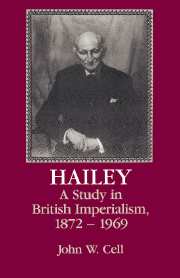Book contents
- Frontmatter
- Contents
- List of abbreviations
- Glossary of foreign words
- Preface
- 1 Early life
- 2 Colonization officer, 1901–1906
- 3 From Sargodha to Delhi, 1907–1912
- 4 Chief commissioner of Delhi, 1912–1918
- 5 A report on the Punjab
- 6 Finance member, 1919–1922
- 7 Home member, 1922–1924
- 8 Governor of the Punjab: the Sikhs, 1924–1925
- 9 Governor of the Punjab: the communal problem, 1924–1926
- 10 Governor of the Punjab: the communal problem, 1927–1928
- 11 Governor of the United Provinces, 1928–1930
- 12 Governor of the United Provinces: civil disobedience and Round Table Conference, 1930–1931
- 13 Governor of the United Provinces: 1931, year of crisis
- 14 Governor of the United Provinces: winding down, 1932–1934
- 15 Surveyor of Africa, 1935–1939
- 16 Two missions to Africa, 1939–1940
- 17 A report and a vision, 1941–1942
- 18 Adviser and propagandist, 1942–1945
- 19 Indian partition and the onset of African decolonization, 1945–1949
- 20 Defender of the faith, 1949–1969
- Bibliography
- Index
17 - A report and a vision, 1941–1942
Published online by Cambridge University Press: 12 October 2009
- Frontmatter
- Contents
- List of abbreviations
- Glossary of foreign words
- Preface
- 1 Early life
- 2 Colonization officer, 1901–1906
- 3 From Sargodha to Delhi, 1907–1912
- 4 Chief commissioner of Delhi, 1912–1918
- 5 A report on the Punjab
- 6 Finance member, 1919–1922
- 7 Home member, 1922–1924
- 8 Governor of the Punjab: the Sikhs, 1924–1925
- 9 Governor of the Punjab: the communal problem, 1924–1926
- 10 Governor of the Punjab: the communal problem, 1927–1928
- 11 Governor of the United Provinces, 1928–1930
- 12 Governor of the United Provinces: civil disobedience and Round Table Conference, 1930–1931
- 13 Governor of the United Provinces: 1931, year of crisis
- 14 Governor of the United Provinces: winding down, 1932–1934
- 15 Surveyor of Africa, 1935–1939
- 16 Two missions to Africa, 1939–1940
- 17 A report and a vision, 1941–1942
- 18 Adviser and propagandist, 1942–1945
- 19 Indian partition and the onset of African decolonization, 1945–1949
- 20 Defender of the faith, 1949–1969
- Bibliography
- Index
Summary
In February 1941, shortly after returning to London, Lord Hailey handed in the report on “Native Administration and Political Development,” which he and Pedler had completed in the Congo. In some ways it was his most significant publication, outranking even the African Survey, for it helped set the framework for British official thinking on African affairs through the rest of the war and anticipated the early stages of decolonization. It contained a long introduction, colony-by-colony examinations, a survey of Southern Rhodesia, and a separate note on amalgamation. Although an edited version was distributed to members of the colonial service, the Rhodesian sections remained unpublished.
Wartime Africa was changing dramatically, the report began. One of the causes was British public opinion. The first stages of colonial rule, which had secured law and order, built elementary communications, and practiced trusteeship with a severely limited concept of the role of the state, had now been superseded. During the depression of the 1930s Britain had redefined the state as an instrument for social welfare; in 1940 the Colonial Welfare and Development Act had extended that concept to the colonies. “The improvement of the economic and social life of the colonial population is an essential part of the policy, to which we stand committed, of fitting them to achieve a self-governing status,” the report declared. Unless social and political development advanced together, however, self-government would remain a cruel illusion.
- Type
- Chapter
- Information
- HaileyA Study in British Imperialism, 1872–1969, pp. 254 - 265Publisher: Cambridge University PressPrint publication year: 1992



